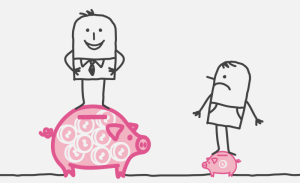I remember the first time my therapist told me, “Sam, you’re doing a good job.”
I remember how overwhelmed with emotion I was. I had worked so hard to keep myself steady and had spent so much time just trying to survive, but I never got any credit for this invisible battle that I was fighting every single day.
For a moment, I couldn’t catch my breath as I repeated the phrase – you are doing a good job – in my head a few more times.
When she saw me – really looked at me and saw my pain, my struggle, my willpower – I felt like my whole soul was being nourished. I was being given something I didn’t even know that I needed until that moment: validation.
People with mental illness don’t get enough credit, enough affirmations, enough love. More often than not, the words we get can feel a little hollow.
In a world that tries to tell us that we are too crazy, too much – in a world that says we are less than in so many ways – I just wanted someone to say to me, “You are exactly enough, and yes, I see how hard you’re fighting.”
If you’re anything like me, sometimes you need someone to acknowledge you, especially when things get tough. So here are some of the affirmations that I wished I had, and that every person with a mental illness (or illnesses!) deserves.
1. You Are Worthy of Love
Yes, even on your worst day, you are absolutely worthy of love, care, and compassion.
Sometimes it can feel like the folks in our lives are doing us a favor by loving us, but this stems from a really problematic idea that we aren’t worthy of love in the first place.
Bullshit. We are. Struggling with our mental health doesn’t make us unlovable, no matter what our exes or so-called friends say.
That’s not to say that we’re perfect. No one is. But perfection is not a requirement for love. We have trauma to work through by virtue of the difficult journey that we’ve been on. But many of us, whether we have a mental illness or not, have things that we need to work on.
Just because you’ve got work to do, it doesn’t mean that you should deny yourself love, or goodness, or happiness.
Mental illness does not make you unlovable. Mental illness does not mean that anyone who loves you is doing you a favor. Mental illness is just one layer of a complicated, beautiful, and whole person
2. You Are Enough
Struggling with your mental health can sometimes make you feel inadequate as a person, like this so-called weakness makes you less than everybody else. If you’ve ever felt that way, I’m here to tell you something: You are absolutely, positively enough – exactly as you are.
No matter where you are in your recovery, no matter what struggle you’re dealing with, and no matter how many times you’ve broken down, I need you to know that you are enough. You don’t need to do anything extra or change who you are to be worthy of good things in your life.
Mental illness doesn’t mean that you’re somehow less important, less worthy, or less remarkable than other people.
I find myself beating myself up at times, wondering why I can’t get my shit together, wondering if these disorders say something about my character. I wonder if it’s a sign that I’m defective somehow. I wonder if it says something about my shortcomings. I wonder if my mental illnesses are a shortcoming.
But you and I are not defective. We are just people, with our own unique journeys and the struggles it took to get here.
Don’t let anyone tell you otherwise.
3. You Are Strong (Even On the Days When It Doesn’t Feel Like It)
You’re fucking tough. You know how I know that? You’re still here.
Don’t believe me? It’s summed up best by this Mary Anne Radmacher quote:
“Courage does not always roar. Sometimes courage is the quiet voice at the end of the day saying, ‘I will try again tomorrow.’”
Every day that you choose to keep fighting is a testament to your strength. Every day that you keep trying, even when everything in you is resisting, is proof of your courage.
Every small victory – getting out of bed, making that phone call, preparing a meal, doing a load of laundry – is yet another example of how strong you are, despite the relentless grip of mental illness.
Give yourself some credit. You deserve it.
4. You Are Not Damaged Goods
Back when I was dating and I wasn’t open about my anxiety or bipolar, I felt like I was carrying around an enormously shameful secret. I felt like I was defective and that, sooner or later, the people that I cared about were going to discover that I, Sam Dylan Finch, was “damaged goods.”
But here’s what I’ve learned: Every one of us, in some way, is “damaged.” And moreover, those struggles, while they may have shaped who we’ve become, are not the entirety of who we are.
And whatever those struggles might be, they certainly don’t depreciate our value. We aren’t meat sitting in a freezer, slowly expiring until we’re tossed aside. We’re people – people that, like anyone else, have had our fair share of challenges to get to where we are today.
Anyone who says we’re less valuable because we’ve struggled in the past does not deserve a place in our present.
Besides, let’s be real. Deciding that someone is less worthwhile because of their disability? That says more about their lack of compassion than it does your value as a person, no?
5. You Don’t Need to Run Away
Sometimes when I’m scared that I’m too much of a burden for the people that love me, I feel this intense urge to just run away.
To turn off my phone, catch the next train and take it up the coast, to don a red trench coat and disappear a la Carmen San Diego. (Yes, this is a fantasy that has run through my head many, many times – and yes, I own the red coat.)
Years ago, I used to disappear abruptly for a day or two, sometimes even weeks at a time, much to the distress of my loved ones. I believed that I just wasn’t good company. I thought I only deserved to have friends when I was feeling good, and if I wasn’t, I deserved to be alone.
Let me save you the time (and money): You don’t need to run away. You are not a burden.
Your friends are your friends because they care about you, not because you’re a circus performer that exists solely for their entertainment. Friends are there on your good days, your bad days, and all the days in-between.
And it’s their responsibility to make sure they’re taking care of themselves, and that they communicate when they need space. It’s your responsibility to trust that, if they need space, they’ll take it.
Instead of running away, just be open about how you’ve been feeling. Give your friends the chance to prove you wrong or to take a step back if they need it. You don’t need to run away just to see who’s going to follow – all you need to do is tell them what’s really going on.
You’re not a burden. You’re a human being who has struggles from time to time. That doesn’t make you undeserving of friendship – if anything that means you need your friends now more than ever.
If your friend was going through a difficult time, I imagine you’d do your best to stand by them. Why is it so hard to believe that someone would do the same for you?
6. You Didn’t Do Anything to Deserve This
Sometimes my twisted bipolar brain would convince me that I somehow brought these illnesses onto myself, or did something to make them happen.
Gentle reminder: It’s not your fault.
And again, for emphasis: It’s not your fault. It’s not your fault. It’s not your fault.
If you had caused this, wouldn’t you have done everything in your power to undo it? Wouldn’t you change this if you could? And wouldn’t you have done that already?
I don’t know why mental illness likes to tell so many lies (what a jerk, right?), but take it from someone who knows: Mental illness doesn’t happen because an individual magically makes it so. It’s a complex combination of psychological, social, and biological factors.
Nothing you did on its own created this monster, I promise. Your first diet or binge didn’t “cause” your eating disorder. Your first cut didn’t “cause” your depression. Your disorganization didn’t “cause” your anxiety.
A dysfunctional response to stress is evidence that the problem existed long before you responded to it. Okay?
So don’t dwell on what you could’ve, should’ve, would’ve done. Instead, focus on your recovery. Be kind to yourself and be gentle.
7. Do Something Nice for Yourself
Self-care is vital. And if you aren’t making time for yourself, it’s time to make time.
Setting aside an intentional moment or two to nourish and take care of yourself isn’t just a luxury – it’s necessary for our mental health.
I wrote an article specifically about self-care for folks with anxiety, talking about how self-care is one tool that I use to help manage the distress that accompanies generalized anxiety, and what steps I take to practice self-care as a person with mental illness.
For many folks with mental illness, self-care is an invaluable coping tool to keep ourselves afloat.
You deserve nice things. You deserve to treat yourself and nurture yourself. The everyday wear and tear that comes with mental illness means that we have to invest in ourselves and our wellbeing. We need to make sure we’re taking care of ourselves to mitigate the impact that mental illness can have on our health.
And yes, even when we’re feeling great, we have to keep investing in our self-care to keep it that way.
Self-care isn’t selfish. It’s necessary. And if you haven’t been putting in the time, now is as good a time as any.
If you aren’t sure where to start, check out this amazing video and take a look at this list of articles here at Everyday Feminism!
8. You Don’t Have to Pretend to Be Okay
I spent so much time trying to hide what I was going through. I locked myself away and I kept people at an arm’s distance for so many years; I thought that I was protecting the people I loved, but in reality, I was hurting us both.
I was hurting them because, in truth, they wanted to help me. They were more hurt that I didn’t trust them or ask them for help when I needed it. And I was hurting myself because it meant that I was battling these illnesses alone – something that I just couldn’t do by myself, no matter how hard I tried.
I’m going to issue a challenge to you: Stop pretending to be okay when you aren’t. You don’t need to be “okay” all the time or even most of the time.
I’m giving you permission to struggle. I’m giving you permission to be sad. I’m giving you permission to be angry. Feel whatever it is you’re feeling, and let the people in your life who want to be there for you actually be there.
Let people in. It’s okay to not be okay. You don’t have to do this alone.
9. You’re Doing a Good Job
You knew I was going to say it, and here it is: Yes, you’re doing a good job.
Living with mental illness(es) can be hard work. And we seldom get any credit for the work that goes into keeping ourselves alive.
On the outside, it seems like what we’re doing is very simple – getting out of bed, cooking ourselves a meal, and maybe dragging ourselves to work. But with disabilities like ours, simple tasks can require a monumental effort.
I see that effort. I know that it’s hard work. And I want to tell you that you’re doing a good job. You’re doing an amazing job. Despite every obstacle that is standing in your way, you’re still doing the best that you can.
I am so, so proud of you for the work that you do, day in and day out, to keep going.
If I could, I’d teleport over to you right now and give you a trophy. I’d also bake you a cake. And then we’d watch Netflix together – because who has the energy for anything else?
I know that it might not always seem like you’re making much progress, especially on the days when you can’t do much other than sleep (I’ve been there, trust me). But even on those days, knowing what you’re up against, it’s a miracle that you’re still around and I’m so happy that you’re here.
Keep taking it one day at a time. And every step of the way, don’t forget to pause and acknowledge the hard work that you’ve done to get where you are.
If you can’t, just tweet me and I’ll do it for you (seriously).
[do_widget id=’text-101′]
Sam Dylan Finch a Contributing Writer for Everyday Feminism. He is queer writer, activist, and educator based in the San Francisco Bay Area. In addition to his work at Everyday Feminism, he is also the founder of Let’s Queer Things Up!, his hella queer and very awesome blog. You can learn more about him here and read his articles here. Follow him on Twitter @samdylanfinch.
Search our 3000+ articles!
Read our articles about:
Our online racial justice training
Used by hundreds of universities, non-profits, and businesses.
Click to learn more





















